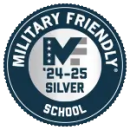ACCT-130
Explore Business Management
Whether you're changing careers or seeking to advance in your field, an online business management degree can help you reach your professional goals. Designed for working adults, our bachelor’s degree in business management program is directly applicable to the organizational challenges you face every day.
This bachelor of business management online program will help you learn how to integrate core business functions in accounting, finance, economics, and marketing to address complex problems and systemic issues in today’s ever-evolving business landscape. Our strengths-based approach to management will shape you into an effective leader and increase your value to your workplace from your first day of classes.
Finish your program faster with credit for prior learning and experience.
Differentiate your degree and get your resume noticed with a certificate. Speak with your advisor for information.
Differentiate Your Business Degree
If you're interested in making your resume stand out, consider differentiating your bachelor's degree in business management by using some of your general elective credits to focus on one of our certificate programs (see the program curriculum below for options). Simply connect with your academic advisor and they will assist you in choosing a certificate and making sure you have your elective credits earmarked for the certificate to give your bachelor's degree in business management a competitive edge.
Build Your Career Future
Having a degree can increase both your immediate job prospects and your long-term career potential. Our accredited online bachelor's degree in business management provides you with the business acumen and subject matter expertise necessary to succeed in a variety of career paths in the business world, training you in both foundational business skills and in-demand soft skills that you can carry through your career.
Program Curriculum
Learn more about Champlain's 100% online business management bachelor's degree, designed for working professionals.
If you're interested in differentiating your bachelor's degree in business management, use some of your general elective credits to focus on one of our certificate programs (listed below). Simply connect with your academic advisor and they will assist you in choosing a certificate and making sure you have your elective credits earmarked for the certificate to give your bachelor's degree in business management a competitive edge.
Champlain's online business management courses encompass the top skills needed by today's business professionals. Graduates of the program are required to complete the following courses.
Business Core Courses (21 credits)
Management Core Courses (24 credits)
Capstone (3 credits)
General Education Courses (42 credits)
General Electives/Certificate Options (30 credits)
Accounting is the language of business. This course introduces the student to accounting from the point of view of the user of financial reports and is appropriate for personal as well as business applications. Students explore the impact of transactions on the financial position and profitability of a business, and analyze financial reports of real-world corporations.
Managerial accounting focuses on the needs of management for accounting information to make informed decisions in the internal operations of a company. Topics include decision-making, accounting for planning and control, cost-volume-profit relationships, and budgeting.
Prerequisites
Provides an overview of the entire legal system, with an emphasis on contract rights. Discusses the essential elements of a contract, the breach of contracts and the remedies for breach. Presents business and consumer laws, including white-collar crime, landlord-tenant rights, real property interests and administrative law.
Students will explore foundational topics such as entrepreneurship, technology, ethics, leadership, and business development while examining the latest trends shaping the global business landscape. Through real-world case studies, hands-on activities, and collaborative projects, students will gain practical knowledge and skills to navigate the dynamic and evolving business environment. This course prepares students to understand business operations, think critically, and develop strategies for success in their future careers.
Business analytics and data visualization transform data into business insights to allow for better decision-making. This course utilizes a combination of existing datasets and common analytics tools to teach new and emerging managers, without backgrounds in data science, how to evaluate data, consider available options, and present a graphical representation of data outcomes for decision-makers.
This course introduces the core terminology and principles of marketing. Students learn about the marketing mix (product, price, place, and promotion), market segmentation, and how external factors such as the economy, technology, culture, and competition influence marketing decisions. The course also examines how marketing fits within an organization and contributes to business success, along with how ethical considerations, cultural awareness, global trends, and social responsibility shape marketing practices across industries. No prior business experience is required.
MGMT 240 is a finance course for managers. It explores financial measurements, the artful application of numbers to solve problems, building financial analysis skills, and the big-picture context needed to understand why finance matters in business management and decision-making. A subset of topics covered in the course include the time value of money, financial statement analysis, ratio analysis, investments, and capital management.
The perspectives, beliefs, and preferences of employees in today's workplace are more diverse than perhaps ever before. Today's high-performing managers are those who foster inclusive, positive, and responsive organizational cultures for their people. But with such varied perspectives, what cultural considerations make the most sense for an organization? Management in the 21st Century will teach students how to foster a workplace environment where people can flourish and are motivated to meet objectives and ambitions for the organization.
Students will learn about the application of positive individual and group strengths and capacities that can be recognized, evaluated, and expanded to advance organizational well-being. This course encourages students to apply positive organizational behavior processes to everyday challenges organizations face to drive positive workplace behaviors and outcomes. This course also helps students to practice and gain skills, knowledge, and competencies to become positive and impactful leaders and change-makers from whatever position they hold.
Project Management is the formal application of knowledge, skills, tools, and techniques to project-based activities to meet organizational requirements. Project management is accomplished through the use of processes such as Initiating, Planning, Executing, Monitoring and Controlling, and Closing. Project managers can divide projects into these phases to provide better management control with appropriate links to the ongoing operations of the organization. Collectively, these phases, known as the project life cycle, form the foundation for the practice of project management and are guided by the Body of Knowledge from the Project Management Institute (PMI).
Students will learn how to create conditions for successful conflict engagement, a necessary skill for any professional. The course focuses on the foundational capacities to remain calm and connected with oneself and others. In this state students can access helpful ideas and responses and be their best selves regardless of environment. Improving facility for conflict creates stronger relationships and reduces fear. By the end of the course, students will understand that disagreement and difference can become a source of personal and interpersonal growth.
Students will learn effective workplace negotiation skills and strategies that they can apply in a wide variety of business contexts including operations, business development, sales, and client relations. Students will explore the negotiation process, including identifying the objectives, challenges and motivations of each party, the various transactional structures that can achieve each party's objectives and the ethical, professional, political, and social issues that can arise in a business negotiation.
In this course students will apply strength-based approaches to support organizations through technological disruption. Key topics such as digital disruption, strategic innovation, digital transformation, and ethical considerations when adopting new technologies will be addressed with focus on leveraging strengths to navigate and capitalize on opportunities in times of change. Additionally, students will develop an understanding of how emerging technologies impact industries and business models, and how to navigate technological change to seize opportunities and mitigate risks.
Organizations cannot avoid change and must embrace it if they wish to remain competitive. However, oftentimes organizational change initiatives fail as a result of poor decision-making, leading to organizational discontent. The goal of positive change leadership is to lead individuals and groups toward opportunities for growth. It entails understanding the factors that cause people to resist change, assisting them in embracing change, and taking the initiative to foster a change-friendly environment within the organization.
In MGMT 465, students will learn that a values-driven strategy is based on a culture and structure defined by fundamental core values that are shared by all stakeholders. In contrast, traditional structures may emphasize authoritarian relationships and rigid decision-making processes. In a values-driven culture, individuals connect their personal values with the organization's principles, resulting in a more engaged and collaborative workforce. Management and leadership set an example by embodying the ideals they espouse, creating a more stable organization over time.
In this final course for CPS business majors, you will complete a comprehensive project that integrates the knowledge you have gained throughout your business program into a work-based learning activity. You will work collaboratively with the instructor, your peers, and, if you choose to, a mentor. Through the project, relevant readings and discussion,you will become reflective and integrative thinkers and self-directed learners.
Prerequisites
108 completed credits
In addition to the following requirements, students must also complete 3 Credits of a General Education Elective (Any ARTS, COMM, CRIT, ECON, ENGL, HIST, MATH, PHIL, PSYC, SCIE, SOCI, MKCM 120, CRIM except CRIM-225)
This course introduces students to the foundational concepts needed to communicate effectively in writing for academic study and professional development. Students will also learn to read critically to evaluate an author's message. Students will be introduced to rhetorical modes and their role in the development of written communication. Students will also learn how to use revision strategies to create written communication that meets its intended purpose for its intended audience
This course builds on students' proficiency in the writing process and rhetorical modes to introduce the use of sources in written communication. Students will practice information literacy as they learn to determine information needs from sources, develop effective search strategies, and incorporate sources in written communication, legally and ethically.
Prerequisites
Complete ENGL-100
Starting with a frame of human communication as a dynamic system of interactions in which people make choices that impact their relationships, other people, and themselves, students will define theory-informed communication concepts and processes, and critically examine how they apply to everyday life across a variety of contexts. Students will reflect on how the theory, concepts and processes apply to their own lives in becoming competent communicators who are knowledgeable, skilled, and versatile.
This course examines the principles of effective small group interaction. Students will analyze group development stages and small group roles. They will identify and evaluate communication skills that enhance small group cohesion and problem-solving. Students will explain how conflict affects group processes and compare face-to-face versus digital collaboration environments. These skills prepare students to participate effectively in group settings across academic, professional, and community contexts.
Students will learn and apply critical inquiry skills to analyze persuasive communication created by others and to develop persuasive communication/arguments of their own to solve problems in professional, civic, social, and personal contexts. Specifically, students will learn to recognize fallacies in logic; apply inductive and deductive reasoning strategies to the interpretation and development of persuasive communication; evaluate the validity of sources; and develop logically sound persuasive communication. Students will explore the roles of self-awareness, empathy, and ethics in the context of critical inquiry and the development of arguments.
Prerequisites
Complete ENGL-110.
This course is an historical overview, and examination of the evolution of digital, film, and print media, and their functions. Students will identify and analyze contemporary problems of the media such as the legal, social, economic and psychological implications of their relationships with society. They also will examine the ways in which marketing and PR professionals utilize the mass media channels to reach their intended target audiences.
This course explores the complex and evolving relationship between human beings and technology. Through a multi-disciplinary approach that draws on fields such as sociology, psychology, philosophy, and history, students will examine the ways in which technology has shaped human culture, identity, and values, as well as how humans have influenced and continue to influence the development, adoption and use of technology.
Mathematical reasoning, when applied to everyday and professional lives, has two dimensions: logic for deterministic situations and probabilities for non-deterministic situations. This course aims to help students develop these mathematical reasoning skills.
This course introduces students to basic statistics for data literacy. With a focus on exploring real-world data, students will interpret numerical information and utilize the tools necessary to complete the entire statistical process: designing a study; gathering, organizing, and analyzing sample data; and making inferences about a population. Students will demonstrate data-driven decision-making and effective communication of numerical data.
Introduces students to the biochemistry and physiology of nutrition and exercise. Emphasis will be placed on human body systems such as musculoskeletal, digestive, respiratory and circulatory, and their relationship to nutrition and fitness. Students will also study the biochemistry of energy conversion as it relates to exercise physiology. Laboratory sessions are designed to reinforce, by a hands-on approach, the principles discussed in lecture. Course includes two laboratory hours per week.
Students will develop the ability to apply scientific methods to understand the natural world, to identify scientific aspects of daily life, and to evaluate the quality of scientific information based on its source and the methods used for its generation.
In this course, students will gain an introduction to classical mechanics and learn about motion, force, energy, and momentum. The course covers vectors, scalars, and coordinate systems, as well as kinematics in one and two dimensions, Newton's Laws of Motion, circular motion, and kinetic energy and work. Students also learn about potential energy and energy conservation, collision theory, rotational motion, moment of inertia, torque, rotational dynamics, and angular momentum.
This course will introduce students to major streams of social justice thought, including historical social justice movements, theoretical problems having to do with social equality, personal freedom, marginalization, and stigmatization, and the ways in which civic and professional communities respond to these issues.
With pressure and release, a window opens and closes, recording light on a sensor. The simple action captures the instinct, judgement, and skill of the person behind the lens. This class will begin a study of the art and craft of photography. Students will develop their vision and their understanding of how to achieve it. Solid skills will be learned and many doors will be opened.
A survey of the continuing change experienced in art since the 15th century. Students will examine how an image is achieved as well as the significance of the subject represented. Individual inquiry concerning the nature of art is encouraged.
Students learn to appreciate films through the critical analysis of various elements of mise-en-scene, cinematography, editing and sound. The course introduces the conventions of classical Hollywood cinema, considers the work of one major director (auteur), and surveys selected international and independent films. Students view and discuss films each week.
Students in the course will explore the cultural history of the music genre broadly referred to as rock. Students will explore the social, economic and political contexts that are influenced by and that influenced each style in the United States. By listening, watching, reflecting upon, discussing and writing, students will explore how music takes on meaning, personally, and culturally. Topics and themes include the relationships between and among gospel, country, funk, folk, disco, rap and hip hop; the role of business and technology in those relationships, and political or transgressive elements of rock music.
Specific application of common tools for writing in the working world. Students will be instructed in rhetorical strategies of professional writing including style, report formats, editing, document design, and integration of visual aids. Students will complete a semester-long writing project; oral and written reports associated with the process of problem-solving within the project will be included.
Prerequisites
ENGL-112 or COR-125
Students will learn how to create conditions for successful conflict engagement, a necessary skill for any professional. The course focuses on the foundational capacities to remain calm and connected with oneself and others. In this state students can access helpful ideas and responses and be their best selves regardless of environment. Improving facility for conflict creates stronger relationships and reduces fear. By the end of the course, students will understand that disagreement and difference can become a source of personal and interpersonal growth.
In this course, students will explore and apply writing principles and techniques to effectively interpret and write technical workplace materials. Students will enhance and gain skills to communicate business and technical information by producing instructions, describing processes, applying document design elements, creating and integrating illustrations, researching and writing proposals and formal reports, and presenting content for decision-makers.
This course introduces students to the fundamentals of substantive criminal law. With this foundation for understanding the legal system students will identify the essential elements of crimes, including the criminal act, criminal state of mind, and jurisdiction. They will examine the rationale underlying criminal law, factors affecting criminal responsibility, and legal defenses. By analyzing real-world scenarios, students will develop skills to distinguish lawful from unlawful actions and prepare for advanced studies or careers in criminal justice.
This course focuses on the rules and procedures governing how the American criminal justice system must process individuals suspected, accused, and convicted of law violations.
In this course, students will explore the theory and fundamentals of criminal investigation, emphasizing practical applications for evidence handling and case development. Students will review basic responsibilities of investigators and protocols for report writing, evidence collection, and preparation of cases for trial. The curriculum examines investigative approaches for various crime categories, including violent offenses, property crimes, terrorism, and hate crimes, while introducing comparative perspectives from diverse legal systems.
Prerequisites
Take CRIM-120.
Principles of Economics introduces the fundamental concepts of economics - the study of how people manage resources, and how they react to scarcity. This course focuses on both microeconomics (the behavior of consumers and companies) and macroeconomics (large-scale economic factors such as employment and interest rates), so that you'll gain a broad understanding of how a modern market economy functions, how decisions in business settings are informed by economics, and how economics applies to your everyday life.
Students will study important themes in the social history of the United States since the Civil War. This course allows students to expand their critical thinking skills through an examination of primary and secondary sources. Themes might include: the evolving status of women; the immigrant experience; the concept of the American dream; the paradox of freedom vs. slavery; the minority experience; the tensions between social classes. Students will be evaluated primarily on writing assignments.
In this course, students will explore broad, foundational knowledge in psychology, including its history, major theorists and a survey of psychology subfields such as developmental, cognitive and social psychology. Students will also describe and assess the role of ethics and social responsibility in the study and application of psychological theory and practices.
In this class, students will explore how social relationships, groups, societies and culture develop and change over time. From a sociological theory foundation and employing the sociological imagination, students will examine the impact of social structures, institutions, and systems on individual lives. Students will apply sociological research methods to investigate sociological phenomena in their own lives.
Utilize some of your general elective credits to enhance your bachelor of science in business management with one of the following certificate options:
- Business Development & Sales
- Healthcare Administration
- Human Resource Management
- Information Technology Fundamentals
- Marketing
- Project Management
See details below.
This course explores the psychological and behavioral factors that influence consumer decision-making. Through a combination of theoretical and applied approaches, students will examine how individuals acquire, process, and use information to make purchasing decisions. Topics include the impact of social and cultural factors on consumer behavior, the role of emotions in decision-making, and the effects of marketing and advertising on consumer choices. Students will apply their knowledge of consumer behavior to the development of buyer personas for an organization.
Prerequisites
Complete MKTG-115
Students will learn how to nurture and identify qualified leads and how to turn those leads into returning customers as they examine the role of sales and business development in the organization. Through role-play activities students will experience the sales process, as they practice how to overcome objections. Students will assess their own sales style and will earn industry standard sales certifications.
Prerequisites
Complete MKTG-115
Ensuring a positive experience and lasting customer/client relationships is crucial for business managers across employment sectors - public, private, and non-profit. Topics such as business process management, customer experience management, customer relationship management, customer service support, and related performance measurements and technologies are covered in this course. Assignments and discussions require application and synthesis of business knowledge and include global issues such as the generation of revenue through strong customer relationships and related outsourcing issues. Students also begin to view business as a group of integrated processes, rather than a group of functional silos.
Prerequisites
MKTG-115
Students gain a systematic overview of the U.S. health care system, including the role of the public and private sectors. Federal and state health policy and legislation are examined in depth. Students develop an understanding of the complex social and environmental issues that are driving the need for quality improvement, performance measurement and the use of information systems. They become familiar with the various mechanisms through which health services are delivered and also compare the U.S. health care system to other systems outside the U.S.
Students examine the role of information systems in achieving performance improvement in health care delivery, and develop the skills necessary to manage information systems. Students learn to manage health information technology to improve patient care, comply with federal and state regulations, and increase clinical and operational efficiencies.
Prerequisites
HCMT-210
Students gain a systematic overview of the financial operations of common health care organizations, both public and private. They gain knowledge about various financial techniques and tools applied to health care settings including revenue stream management, budgeting and resource management allocation, and third party payer management. Students identify and analyze key issues confronting the financial management of health care systems and provide strategies for effective management of these financial challenges. This course will emphasize the intersection and integration of health resources management, both clinical and financial, in quality improvement efforts.
Prerequisites
Take HCMT-210
Human Resource professionals have to be keenly aware of the employee lifecycle (ELC) - a method used to visualize how an employee engages with a company. The first stage of the ELC is attraction. Regardless of how strong your company is, without attracting great talent, your company will fail. The second stage, recruitment, is the period where you seek out and recruit the best talent to join your organization.
Students gain an understanding of the health care industry's organizational performance measures and assessments related to the improvement of healthcare service quality. Topics explored include traditional quality, structure and process assessments including risk management, credentialing and the role of oversight agencies; outcomes-based process improvement methods focusing on rapid-cycle tools, such as PDSA, and using small tests of change. Students apply measures and assessments directly to the complex issues and concerns of health care administration.
Prerequisites
HCMT-310
This course provides students with a comprehensive overview of U.S. employment law, emphasizing the legal and regulatory issues that impact the workplace. Students will explore the foundational elements of the employment relationship and key laws governing hiring, compensation, workplace safety, discrimination, employee rights, and termination. Designed for future human resource professionals and business managers, the course integrates legal theory with practical application, helping students understand how to navigate compliance, mitigate legal risks, and promote ethical employment practices in today's evolving work environment.
Human Resource professionals have to be keenly aware of the employee lifecycle (ELC) - a method used to visualize how an employee engages with a company. The first stage of the ELC is attraction. Regardless of how strong your company is, without attracting great talent, your company will fail. The second stage, recruitment, is the period where you seek out and recruit the best talent to join your organization.
Occurring after human resource professionals have recruited top talent, the onboarding period is critical to getting new hires well-adjusted to the organizational environment and performance aspects of their new job. During the development period, HR professionals begin to consistently encourage professional development among their teams, which acts as a catalyst in their skill development and also helps provide them with a future career path within the company.
Compensation and Benefits will provide students a detailed understanding of how to develop a Total Rewards Program (TRP), and the strategic choices employers make when selecting TRP financial terms. The course covers the implementation of compensation strategies, benefits packages, work-life balance programs, performance and service recognition strategies, and career development strategies.
Employee retention is focused on keeping top employees, and ensuring they're happy and sufficiently challenged in their respective roles within the organization. The influence of company culture goes a long way in this lifecycle stage. If the culture in the organization is poor, it inevitably leads to high employee turnover rates. In the event an employee leaves the organization, approaching the separation process strategically is critical. When a team member leaves, it has an effect on other members.
This course provides students with an understanding of the many different devices and technologies, from historical to emerging, that are required to design and build networks. In a broad survey of concepts and terminology, students will learn about topology, communications, protocols, and security, and to diagram basic networks to specification.
From day one, students in this course are problem solving, first in terms of algorithmic design and then as early as week two via programming in the latest version of Python, using PyCharm. Students begin by writing a program to have a conversation, having strings and numbers as input, and advance, by week seven, to building a working password saver program, capable of looking up, adding (and encrypting), and storing passwords.
Learn the basics and more in this course on Relational Database Management Systems (RDBMS) and SQL (Structured Query Language). Students propose a final project in the first module and then work, week-by-week, to design, create, and populate the database. Then, students learn to create queries and stored procedures.
This course will introduce foundation subject matter and technologies that are critical to the multidisciplinary landscape of cybersecurity.
This course is a thorough review of the Transmission Control Protocol/Internet Protocol (TCP/IP) which is used extensively in corporate enterprise networks and the Internet. The course will cover the structure of TCP/IP, its application to data networks, and security issues.
Prerequisites
CMIT-130
This course covers the fundamentals of systems analysis while emphasizing the role of communication and other soft skills needed in IT and in business overall to be successful. The topics are useful for anyone who is involved in developing software system requirements and architectures (e.g., users, technical managers, product managers, technical leads, programmers, other software project team members, and clients).
Prerequisites
CMIT-135, CMIT-200, MGMT-260
This course explores the psychological and behavioral factors that influence consumer decision-making. Through a combination of theoretical and applied approaches, students will examine how individuals acquire, process, and use information to make purchasing decisions. Topics include the impact of social and cultural factors on consumer behavior, the role of emotions in decision-making, and the effects of marketing and advertising on consumer choices. Students will apply their knowledge of consumer behavior to the development of buyer personas for an organization.
Prerequisites
Complete MKTG-115
Students will learn how to nurture and identify qualified leads and how to turn those leads into returning customers as they examine the role of sales and business development in the organization. Through role-play activities students will experience the sales process, as they practice how to overcome objections. Students will assess their own sales style and will earn industry standard sales certifications.
Prerequisites
Complete MKTG-115
This course will provide an overview of digital marketing strategies and techniques for organizations operating in a digital environment. Students will learn about consumer behavior in digital spaces as well as tactics including search engine optimization (SEO), pay-per-click (PPC) advertising, email marketing, social media and content marketing and analytics. Students will apply what they learn to the development of a digital audit and recommendations project for an organization. Additionally, students will earn several industry certifications as part of their coursework.
Prerequisites
MKTG-115
Students will develop a resonant, data-driven, and ethically sound Integrated Marketing Communications Campaign for a real-world client. Utilizing all elements of the promotional mix, they will design this IMC campaign to achieve all objectives set forth by the client.
Prerequisites
MKTG 200
Project schedules allow managers, team members, and stakeholders to track progress, set and manage expectations, communicate, control costs, and collaborate. Tasks and deliverables can be monitored and controlled to ensure timely delivery-and if any delays do occur, project managers can easily gauge their impact and make the necessary adjustments. Central to the schedule is a detailed understanding of the project budget, and working to control costs and manage stakeholder expectations.
The process of managing stakeholders is an important project management activity that focuses on communicating and managing stakeholder expectations and concerns for the purpose of meeting needs, addressing issues, resolving conflict situations, and achieving the project goals. The process is generally based on holding communications and taking change requests to gather feedback and make updates to project documentation. Similarly, managing project teams is the process of tracking team member performance, providing feedback, resolving issues, and managing team changes to optimize project performance. The key benefit of this process is that it influences team behavior, manages conflict, resolves issues, and appraises team member performance.
The traditional practice of project management is based on the notion that the customer can understand and articulate his or her requirements fully and up front. Unfortunately, this is rarely the case and often customers either don't understand precisely what they need or, more often, will know it when they see it. This is where Agile Project Management comes in. Whether you are managing a project, are on the forefront of a new business venture, or are developing new business processes, Agile Project Management can help managers meet their goals without compromising business value or quality. This course will provide a foundation in Agile and build competencies in Agile Project Management through simulation, case study analysis, and software. Students will receive hands-on experience with agile and scrum processes in a class project. Students will also investigate Agile value principles, release planning, portfolio governance, and the Scrum methodology.
In project management, understanding the difference between risks and issues is critical to project success. Risk Management is the practice of identifying potential problems and addressing them before they happen, with treatments such as avoidance, reduction, transfer, and acceptance. Issue Management is the practice of addressing current problems, with approaches such as problem-solving, mitigation, transfer, and acceptance. Keeping running logs, in addition to controlling and monitoring issues and risks, often means the difference between project success and failure.
When an organization introduces a change to a project, that change needs to be effectively managed through two lenses: technical and human/organizational. A technical focus ensures that the change is developed, designed, and delivered effectively. The discipline of project management provides the structure, processes and tools to make this happen. A human/organizational focus ensures that the change is embraced, adopted, and utilized by the employees who have to do their jobs differently as a result of the project. The discipline of change management provides the structure, processes, and tools to make this happen. Although each discipline can function independently, the most effective approach is to integrate change management and project management to create a unified approach to implementing change on both fronts.
Additional Program Details
Graduates of the business management bachelor's online program will demonstrate the following industry-specific skills, knowledge, and competencies:
- Utilize strengths. Cultivate and leverage an organization's assets and human strengths to help transform workplace culture and optimize performance
- Use business acumen. Identify, contextualize, and utilize core business functions to address business challenges
- Communicate effectively. Utilize effective communication methods that motivate, articulate, generate and achieve desired results
- Be fair-minded. Contribute meaningfully to diverse, fair, and inclusive teams and organizations
- Use business technology for advantage. Identify technology that captures, analyzes, and shares organizational data and information, and creates business value
- Think systemically. Use systemic and critical thinking to evaluate and address complex organizational issues
Design your own degree and enhance its value and focus by adding a certificate. Adding a certificate allows you to develop specialized skills, strengthen your résumé, and tailor your education to align with career goals. Choose from the undergraduate or graduate certificates on this page.
Note: To earn a certificate, you must speak with your advisor first. You must be officially enrolled in the certificate program before you complete the required courses in it — coursework completed prior to enrollment cannot be applied later, and certificates may not be added retroactively. Careful planning with an advisor is essential to ensure all policies and timelines are met.
Our admissions team seeks to admit students who:
- Demonstrate a solid academic foundation - a minimum 2.5 GPA is our recommendation, though exceptions may be made on a case-by-case basis for those who demonstrate a potential for academic success in other ways.
- Possess an aptitude for success in an online learning environment.
- Exhibit the ability to make a positive contribution to the Champlain College Online community.
To learn more about submitting transcripts, or requirements for home-schooled students, those educated abroad or returning students visit our Undergraduate Admissions page.
Our transfer credit evaluation team works hard to ensure you get the transfer credits you deserve, from a variety of sources including prior college credits, work experience and training, military training and experience, and more. Our goal is to help you graduate from Champlain College Online as quickly and affordably as possible. Visit our Transfer Credit Options page to learn more.
Champlain College Online's business faculty, led by Department Chair Dr. Elaine Young, are expert practitioners in the field. Their industry expertise ensures that our business management curriculum is aligned with the needs of employers, and reflects the skills today’s business professionals need for success. Classes led by our seasoned experts will give you real-world insight into the business world, and create a rich community of career-focused learning.
Tuition & Costs
Online Undergraduate Tuition Fall '25 - Summer '26
Tuition & Costs
Online Undergraduate Tuition Fall '26 - Summer '27
* Alumni is defined, for this tuition rate, as any degree program graduate from Champlain College or Champlain College Online.
** Veteran rate effective Spring 2025, not retroactive
See the undergraduate cost of attendance and fees here
Affordability and Paying For Your Education
We provide a number of options to make your online education affordable, including preferred tuition for alumni, associate degree graduates, community college graduates, and military.
What Can You Do With A Degree In Business?
Business and financial occupations are expected to grow 8% from 2020 to 2030, faster than the average growth for all fields, as a result of an increasingly complex global business landscape. The median annual wage for these roles is $72,250.*
Graduates of Champlain's online bachelor's degree in business management will be prepared to succeed in a variety of career paths across many fields and industries, including human resources, business analysis, administrative services, operations, and sales.
*Source: Bureau of Labor Statistics (BLS), 2020; jobs titles: Payscale, 2020
Top Jobs for Bachelor's in Business Management Graduates
- Accountant
- Business Development Specialist
- Financial Analyst
- Management Consultant
- Office Manager
- Operations Manager
- Sales Representative

Why Champlain
Superior Faculty
"The classroom environment was great, and the faculty were very helpful in terms of reaching out and being available. All of my professors were willing and ready to call, email or text whenever I needed them."

Academic Excellence and Recognition

Regionally accredited by the New England Commission of Higher Education

Designated as a Military Friendly School for our commitment to the military community
Ranked among the best by Tech Guide for game design and computer science

Named the among the best schools with accelerated bachelor's degrees by Intelligent.com
Meet The Program Director
Elaine Young, PhD
- Accounting (Certificates, A.S., B.S., M.S.)
- Analytics (Certificates, M.S. Programs)
- Business (Certificates, A.S.,B.S.,MBA)
- Digital Marketing (B.S.)
- Digital Marketing and Technology (M.S.)
- Digital Media (B.S.)
- Esports Management (B.S.)
- Finance (Certificates, A.S., B.S.)
- Healthcare (all programs)
- Human Resource Management
- Leadership (Organizational and Digital Transformation)
- Management Information Systems
- Marketing (M.S.)
- Marketing Analytics (M.S.)
- Marketing & Communication (B.S.)
- Marketing Management (B.S.)
- Positive Organization Development Certificate
- Positive Organizational Psychology & Development
- Project Management
- Public Administration
About
Dr. Elaine Young is the Program Director for all business programs, and Curriculum Innovation Faculty Lead, at Champlain College Online.
As chair, Dr. Young manages the faculty, curriculum, and assessment for undergraduate and graduate programs in the business programs as well as developing and teaching courses. As Curriculum Innovation Faculty Lead, Dr. Young supports creation of new curriculum offerings that serve both the needs of adults continuing their education and employers who need educational opportunities for their employees. Prior to her leadership role at Champlain College Online, Dr. Young has been part of the Champlain College community since 2000 as a professor and faculty advisor for traditional on-campus students. She is a HubSpot Educator and a Certified Appreciative Advisor.
Dr. Young has a Ph.D. in Organizational Management from Capella University, where her dissertation research examined technology use and adoption of college students. In addition, she holds an M.S. in Internet Strategy Management from Marlboro College, a B.S. in Communication and Public Relations from SUNY Brockport and an A.S. in Communication from Genesee Community College. Dr. Young has over ten years of experience in the Marketing and Public Affairs profession, specializing in nonprofits. She is the author of “Tuned-in Family: How to Cope, Communicate and Connect in a Digital World” (2014).

Frequently Asked Questions
The online business management degree at Champlain College is a bachelor of science (b.s.) degree.
Yes, at Champlain College you can pursue a fully online business management degree.
Yes, Champlain College Online offers several specialization options within its Bachelor of Science in Business Management program. These concentrations allow you to tailor your degree to align with specific career goals and industry demands. Concentration areas include HR Management, Project Management, Marketing, Business Development and Sales, Healthcare Administration, and IT Fundamentals.
You can develop skills in leadership, strategic thinking, financial management, communication, marketing, project management, business ethics, and decision-making. These diversified skills are valued in a number of leadership career paths.
You May Also Be Interested In
Get Your BS in Business Management Program Guide
Learn what you can expect from our online bachelor's in business management program.

Download Program Guide
I acknowledge that, by clicking the "submit" button, I am giving my express written consent to Champlain College and its representatives to contact me about educational opportunities via email, text, or phone, at the phone number above, including my mobile phone, using an automatic dialer, or pre-recorded message. Message and data rates may apply. I understand that my consent is not a requirement for enrollment, and I may withdraw my consent at any time.






